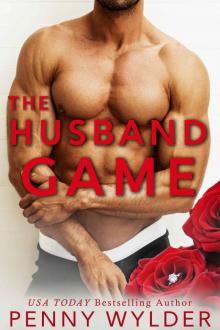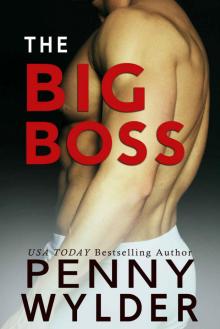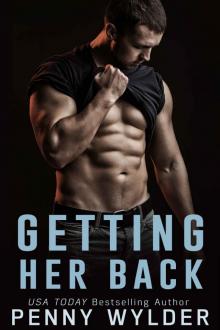- Home
- Wylder, Penny
Basket Stuffer
Basket Stuffer Read online
Basket Stuffer
Penny Wylder
Contents
1. Pippa
2. Pippa
3. Bernard
4. Pippa
5. Bernard
6. Pippa
7. Pippa
8. Bernard
9. Pippa
10. Pippa
Epilogue
Good Time Doctor
Books By Penny Wylder
1
Pippa
Now
My fingernails claw at the wooden wall in the cramped confessional no bigger than a closet. It smells like mint and old people, and now sex. In the belfry, the church bells trill, masking the sound of the squeaky bench as our bodies rock together in a rhythm that pushes him deep into me at all the right angles. Our slick wet skin squelches together, the sound filling the little booth. He leans me over, my face against the grate, a waffle shape pushed into my skin from the partition. If a priest were to open up the slider, he’d get an eyeful of my bouncing breasts.
The bells stop and laughter rings out in the distance, happy sounds of the Easter Sunday festivities. I should feel guilty. I should repent. But all I feel right now is pure lust.
He takes me by the shoulders and forces me to sit on his lap, facing away from him. I ride him hard. He grabs a fistful of my hair and pulls my head back to bite my neck. I want to scream with pleasure, but that laughter in the distance reminds me that if we’re caught, I’m screwed—and not in the good way.
I clamp my bottom lip between my teeth to keep quiet as he reaches his hand around to rub my clit. He takes turns stroking and pinching and pulling until I see stars flash behind my eyelids. With each flick to my clit, he takes me closer to the edge. By the pressure building up inside of me, I can tell this won’t be a quiet orgasm. Not even close. I should tell him to stop, but I can’t. Everything he’s doing to me feels far too good to stop him now. It’s been so long since I’ve had an orgasm that wasn’t self-inflicted. I need to see this to the end.
He puts his palm against my back, pushing me even further forward until my hands are touching the ground and I’m folded in half like origami. He lets out a deep, aroused sound and spanks my ass, hard. Hard enough to leave a mark. Hard enough to almost make me cum instantly.
“Fuck yes,” I say, feeling especially dirty when the words fill the small confessional booth. How many Hail Marys will I have to say to get forgiveness for this moment in church? I imagine it might take the rest of my life to get through them all. Is it worth it?
God, yes.
He pulls me up by my hair again and pushes me flat against the wall. His groin smashes against my ass with each thrust, causing our skin to slap together like applause.
He bites my earlobe and breathes the words, “Your tight pussy feels go good around my cock.”
He starts to play with my clit again and my body goes rigid and there’s a quivering that starts in the pit of my stomach and builds pressure, radiating throughout the rest of my body. I feel everything and nothing at all as every nerve ending starts to snap and pop with electricity.
“Oh, fuck,” I say as my first orgasm rushes toward me.
He continues to slam into me, beating my body against the wall. And all the while he’s wildly fucking me, and after my father’s warning not to sin this day, all I can think is how did this happen? That is until my orgasm explodes from of me, and then I’m thinking about nothing at all.
2
Pippa
Three Days Ago
I rush up the stairs of Birdie Matheson’s house, my high heels clicking on the ground in a rushed staccato. More like a mansion, if I’m being real. Anyone who lives in this part of town has a minimum of five thousand square feet, and those are usually reserved for their pool houses.
They are all part of my mother’s high-society book club. I love books, and at first I was excited to join the club and talk about characters and the shared stories we love, but once I actually joined, I realized the club was nothing like I was expecting. It was no different from all the other socialite clubs they attend. See and be seen. These people, with their exotic cars and fancy homes, their yachts and seersucker and Fendi bags, are bloated with money and like to rub it in the faces of everyone they come across. It’s a big game of one-up. Who has more money, who has more toys. Whose kid goes to the best college. That seems to be the favorite. My poor mother would love to play that particular game with her friends, but when I married, my husband decided college was out of the question for me and so my parents chose to brag about my husband instead.
It’s not the books these people love, but the excuse to gather and brag about all the new things they have. I hate them all. Mostly because I used to try and be just like them before my husband divorced me a month ago. This was my parents’ world growing up. This is the world I was born into and eventually married into. This is the world I will run away from as soon as I get the chance.
No matter how hard I tried to fit in with this crowd, I never quite belonged. My parents are just as wealthy as the rest of them and so, I guess, by default, I should fit in as well. But I never really cared about the material things. I always enjoyed art and reading. Things you didn’t need money to enjoy. And so boats and cars and houses became just things to clutter up yards and unnecessary expenses.
My “friends”—or so they called themselves—were nothing like me, and I think that’s why I never got close with any of them. They all had jobs, either at wine companies, or art galleries, or non-profits—not that they needed the money. They just liked to say they earned the things they owned. I didn’t have money of my own. I was married right out of high school after our parents set us up. My husband never let me work while we were together. I used to find it charming and old fashioned even though I really wanted to work and make my own money. More than anything, I wanted the pride that came along with it. But he wanted me to be a housewife, and at one point, I wanted to be that. Mind you, I wasn’t great at that particular job. I couldn’t cook or bake despite all the classes I took. I’d even taken classes from famous chefs seen on reality TV shows. Because of my failures in the kitchen, my husband and I ordered takeout on a daily basis, but I could make a damn beautiful table setting.
It wasn’t just the cooking I wasn’t any good at. It was all the other little things that came with being a stay at home mom as well. The dishes never got quite clean. Doing laundry always ended with a load of whites turned pink. People often mistook my son for a girl whenever we’d go out because of it.
For a while I thought I was part of a happy marriage. I’d always been an honest person, but I was a liar to myself. I didn’t know what a happy marriage was when it came right down to it. I knew I didn’t feel happy, but I blamed myself. I had a big home, a nice SUV, and all the money I could possibly want, and yet I was miserable. I convinced myself I was just a selfish person and tried to be more positive in the hopes my feelings would change. They never did.
It wasn’t long after that when my husband left. He took off to Mexico with his mistress. I was left desolate, with a pile of bills and no money to pay them. He didn’t care what happened to me or our four-year-old son. If it weren’t for my parents coming to the rescue, I don’t know what would’ve happened to us. I’ve been living on my dad’s dime ever since. It’s a humbling experience, being back under my father’s thumb. He’s a domineering man, and my mom isn’t much better. She likes to play good cop, but whenever she sees the opportunity to tattle to my father, she takes it.
I guess in a way, it’s not much different than living with my husband. There was never a partnership. We were never equals. My whole life there has always been someone there to tell me what to do and run my life.
The mansion looms over m
e, casting a giant shadow across the perfectly landscaped yard. It must cost a fortune to upkeep a yard like this. It has more of an appearance of an enchanted garden. To call it a mere yard is insulting. Must take the groundskeepers all day to just rake the leaves away.
Cars—all with six-digit price tags—are parked in neat rows by the valet. And then there’s my Honda Civic, five years old, seventy thousand miles on the odometer, parked off to the side like a disease the other cars might catch if it gets too close. My parents hate my car, but I earned it with the money I made from baby sitting in high school. My first real purchase and I refuse to get rid of it. It still runs perfectly. I’ve never broken down or had to do repairs. Why would I get rid of it? They find it so embarrassing, and whenever their friends come to the house for tea or brunch or poker nights, my parents make excuses. They make a point to tell everyone that they would buy me a new car if only I weren’t so stubborn. I just know one day I’ll go outside and my car will be replaced with some shiny expensive car that is no more reliable than my Honda, but with a million little extra gadgets that no one needs.
I lift the heavy iron knocker on the front of the door, thinking that a house this nice should have something slightly more high-tech than a knocker. But I guess that would kill the charm of old money, wouldn’t it? There are rules for these things. The Mathesons got their money from an oil boom back when the United States was an infant. This old mansion with its original furnishings and antique charm has sat unchanged for hundreds of years. Unlike the techies—equally as wealthy—with their smart cars and smart homes. It’s a good thing all their belongings are smart because without them, they wouldn’t know what to do with themselves.
Usually those with tech money and those with old money don’t tend to mingle in social settings. But here, in this book club, money is money, no matter how you got it. All that truly matters is how much of it you have. If you could swim in a vault of it like Scrooge McDuck in those old cartoons, you’re welcome under this roof. If it weren’t for my parents’ money, I would’ve been kicked off the property the moment my Honda came into view.
A housekeeper opens the door and starts to say something. She probably wants to see some ID because I don’t look anything like the women in this book club. Despite the expensive dress I wear that my mother got me, the rest of me is a mess. My hair is natural, and it’s obvious I haven’t been to a salon in practically … never. The polish on my nails is chipped, my teeth are real—no veneers here—and my skin is the color it should be instead of the unrealistic orange spray tans the other women wear year round.
Before the housekeeper can send me away, I push past her and say, “I know the way,” as I run the best I can in five-inch-heels. I wore the most expensive dress I could find, a Prada summer thing my mom bought me when she went to fashion week. She always made sure I had something nice to wear in front of her fancy friends. Otherwise those clothes sit in my closet collecting dust. It’s not my style. I’m a jeans and t-shirt kind of girl. The only things I usually splurge on are shoes. Because shoes!
But I have to admit this Prada dress looks good on me. It’s a pretty copper that brings out the blue in my eyes. My shoes, on the other hand, I got for fifteen dollars at a discount store. I love me some designer shoes, don’t get me wrong, but I couldn’t find a single thing to match this dress. It’s a hard color to pair with (though I imagine many of the women in the club wouldn’t have trouble—especially since most of them have personal stylists on their payrolls).
Since I couldn’t find any shoes to wear with this dress, I had to improvise and search the department stores. If I ever told my mother that, I would never hear the end of it. Not that I need to tell her. She’ll figure it out anyways. My mother, like all the rest of the women in the book club, has eyes like hawks when it comes to spotting knock offs or cheap clothing. They’ll spot me from a mile away, but I didn’t have time to change before I came over. To anyone else they would look find, so they’ll have to do.
As I run, one of the heels catches on the edge of an intricate Persian rug, snapping it clean off.
And that’s what I get for wearing cheap shoes.
“Shit,” I say, managing to keep my forward momentum without falling. I hop on one foot as I take the heel off, and then the other, caring my shoes and running in bare feet. My feet slap against the granite tile, making an even more obnoxious sound than the heels did.
I’m sweating my makeup off as I make it down the hallway that displays generations of the Matheson family in elaborately carved gold frames. You can see the evolution of plastic surgery in all the photos of the women over the years. The photos from decades ago, of great grandmother, and great, great grandmothers and so on, show women who weren’t all that attractive. They all look the same with their masculine jawlines, their crooked noses and heavy brows. But as the years progress, so do the “improvements” in their faces. Those crooked noses are now straight. The jawlines softened. Teeth are unnaturally straight and white. There is no longer even a hint of familial resemblance in the pictures.
When I burst through the door of the home’s massive library, at least twenty heads turn my way, all of them scowling and sour. The most intense of them all is my mother. Her face turns a deep, pissed off red, but she recovers quickly like the society lady she is and she smiles. But I see through the veneers right down to the fangs. I just know I’m going to get an earful when I get home.
“You’ll have to forgive my daughter. She’s been busy with charity work at the library.”
I really was at the library, but it had nothing to do with charity work.
I’m forgiven for the intrusion with smiles and nods because this is a book club after all, and they have to at least pretend to care about libraries and books.
After a few quick glances and scowls at my bare feet, the women go back to their conversations and my mother pulls me to the side, her manicured acrylic nails digging into the skin of my arm. “You and I are going to discuss this later,” she hisses at me.
Awesome.
* * *
Sitting through book club is exhausting. Most of the women make vague enough comments about the book we’re discussing to make others think they actually read it, but I know they didn’t. Because I’ve read the book many times. The book is Rebecca by Daphne du Maurier and these women keep calling it a tragic romance, which it is not. Each time they make their comments, I can’t help but roll by eyes, which earns me a subtle elbow to the ribs by my mother. The day drags on and on until I feel it will never end.
When we finally get home, my dad is waiting for me. My mom must have called and told him that I was late. And bare foot. And acting insolent. His brows push together, his lips in a frown that looks far too natural on a face as young as his. He’s only fifty-five, but he looks like he is sitting comfortably in his seventies right about now. Maybe I did that to him with all my childhood and adolescent shenanigans, but I won’t take all the blame. They treated me like an imprisoned princess as a young adult, locked up in my fortress, forced to play piano and sit up straight, and know which fork to use. If they’d only let me be a normal child, I might’ve gotten all my rebelliousness out of my system back then. But instead, they arranged a marriage for me straight out of high school with the son of one their business partners who also kept me on a tight leash. And now all I want is to break free of their suffocating chains.
“What did I say about making a good impression with my friends?” my father says. He’s sweating and the corner of his eyes twitches the way it always does when he’s mad.
“To make a good impression with your friends …”
“Don’t get smart with me. We made a deal and you broke your end of it.”
Our deal was that he would allow my son and me to stay with them as long as I made a good impression with his friends. What they really wanted from me was to find another husband in their inner circle. And for that to happen, I needed to play nice and be proper. So far that wasn’t working out
so well for them.
“I was late. It’s not like I showed up in my underwear, covered in hickeys.” Though the looks on all those snobby women’s faces if I did would’ve been priceless.
My father doesn’t seem to see the humor in it. His chest puffs up and his hands go to his hips. “That’s it, Pippa. If you don’t get your act together, I’m cutting you off.”
“You would leave me and my child desolate? Your own grandson?” I say, matching the angry tone of his voice. If there’s one trait I got from my father, it’s his stubbornness. Two can play at this game.
“I’ll cut you off, not your child. But we’ll see how long you’ll be able to keep him when you’re penniless on the street.”
I look at him, shocked. Is he really threatening to take my child? I continue to stare him down, but he won’t meet my eyes. I hate that he can use his money against me.
“If you behaved like this when you and Joshua were married, it’s no wonder he left.”
The words hit me in the gut like a physical blow, and the air whooshes from my lungs. I hold a hand to my stomach. By the look on his face, he has no idea just how badly his words hurt. My father has always been clueless when it comes to other’s feelings. It’s why he and my mother make such a wonderful couple: she doesn’t have any for him to hurt.
A punch to the face would’ve been kinder. I always hear stories from people who knew my parents when they were first starting out, before they made their millions. I’m told they were caring and wonderful people. Whatever is left of those people from the past is gone. Their wealth changed everything. Money is dangerous and causes serious side effects. Like blindness and a serious stick up the ass.

 For Us: The Girl I Loved
For Us: The Girl I Loved The Bad Boy’s Bride
The Bad Boy’s Bride Best of Penny Wylder: Virgin Romance
Best of Penny Wylder: Virgin Romance Best of Penny Wylder: Boss Romance
Best of Penny Wylder: Boss Romance Married to my Dad’s Best Friend
Married to my Dad’s Best Friend Married to the Secret Billionaire
Married to the Secret Billionaire Basket Stuffer
Basket Stuffer Don’t Touch
Don’t Touch The Convenient Wife
The Convenient Wife The Marriage Dare
The Marriage Dare Work Me Up
Work Me Up Living at the Frat House
Living at the Frat House Summer with my Dad’s Best Friend
Summer with my Dad’s Best Friend Overnight Wife
Overnight Wife Rich Soldier: The Dirty Thirty Pledge Book 2
Rich Soldier: The Dirty Thirty Pledge Book 2 Kiss Me Now
Kiss Me Now Big Man’s Heat
Big Man’s Heat The New Boss
The New Boss The Husband Game
The Husband Game Her Big Neighbor
Her Big Neighbor Big Man’s Happily Ever After
Big Man’s Happily Ever After Can’t Touch
Can’t Touch Forbidden Bride
Forbidden Bride The Big Boss
The Big Boss Marry Me Now: An Arranged Marriage Collection
Marry Me Now: An Arranged Marriage Collection Big Bad Boys: A Romance Collection
Big Bad Boys: A Romance Collection The Billionaire’s CamGirl
The Billionaire’s CamGirl Club Deep: The Complete Series
Club Deep: The Complete Series Getting Her Back
Getting Her Back Happily Ever After with My Dad’s Best Friend
Happily Ever After with My Dad’s Best Friend Valentine’s Day Virgin
Valentine’s Day Virgin The Single Dad Arrangement
The Single Dad Arrangement Big Man’s Claim
Big Man’s Claim Dating My Friend's Daughter
Dating My Friend's Daughter The Wife Arrangement
The Wife Arrangement